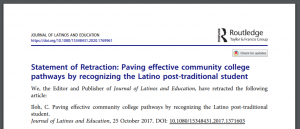A cancer researcher who lost nine papers in one day as a publisher purged articles offered in “authorship-for-sale” schemes told Retraction Watch he and his co-authors “will soon defend ourselves legally.”
Last month, the publisher Frontiers announced it had retracted 38 papers after its research integrity team found links to the practice of buying and selling authorship positions. Brokers list advertisements for authorships of scientific papers on dedicated websites as well as social media.
Nine of the 38 articles Frontiers retracted listed Mostafa Jarahian, formerly of the German Cancer Research Center (DKFZ) in Heidelberg, as a co-author.
When we initially reported on the large batch of retractions, one of Jarahian’s co-authors shared an article from Frontiers indicating the publisher had decided to retract the paper after “concerns were brought to our attention from the German Cancer Research Center regarding the authorship of the article.”
Continue reading Cancer researcher with nine retractions says he’ll take publisher to court






